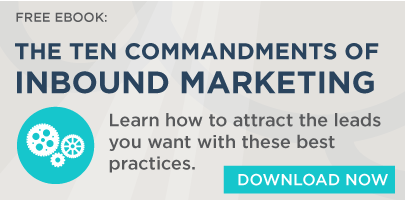Inbound Marketing Commandment #4: Thou Shall Have a Written Lead Generation Follow Up Strategy
As part of the LeadG2 series on "The 10 Commandments of Inbound Marketing" we are discussing each of these ten commandments and the importance of...


As part of the LeadG2 series on "The 10 Commandments of Inbound Marketing" we will be discussing each of these 10 commandments and the importance of each one. Also, we will be discussing why these principles are ones that you can’t ignore. The second of The 10 Commandments of Inbound Marketing is: Sales must be involved in your inbound strategy at each stage from conception to implementation to follow up. (Tweet This)
We have all heard the metaphors about sales and marketing "being from different planets" or like "cats and dogs" because the two departments can’t get along. Some have tried to even express this distaste between sales and marketing as a full blown "war." I think a lot of this is sensationalized to get people to read books and articles, but one this is for sure: companies that have more closely aligned sales and marketing team tend to perform better. This is why we encourage early involvement and involvement throughout the process from the sales team when implementing an inbound marketing program.
With one of inbound marketing’s main purposes being to generate leads and close more sales, any effort is doomed to fail if the sales department is left in the dark until the strategy is fully developed and implemented.
After all, it’s the sales team that will be needing to understand how to follow up on leads that are generated from white papers and form fills and to understand that the inbound sales process differs from a traditional outbound sales approach. Also, if key sales leaders are brought in early, they can help shape and develop the plan and feel accountable and vested in the outcomes. Without buy-in from the senior sales team, your chances of success rapidly decrease.
Another issue that can be discussed early on between the sales and marketing departments is the development of goals and acceptable lead counts. This includes defining what a good lead looks like, what’s deemed a Marketing Qualified Lead (MQL) and Sales Qualified Lead (SQL), and what roles each of the respective organizations have in managing the process.
Without this early communication, the marketing department will be working hard to develop leads that may or may not be qualified, and the sales department won't be sure on how to qualify or follow up on the leads. This creates a scenario where Marketing feels as though they are doing what they are supposed to, while Sales feels as though Marketing is setting them up for failure with poor quality or a lack of leads.
As with any sound strategy, it’s not as simple as “set it” and “go forward” with the plan without periodically reviewing progress and course correcting. At LeadG2, we recommend that Sales and Marketing meet at least quarterly, but preferably monthly to discuss the quality of leads and the sales pipeline. By conducting a monthly meeting with the key leaders in each department, you can make sure that Marketing is bringing in enough quality leads and producing enough content and Sales is doing a good job of following up and closing sales. This will also help to fine tune any challenges that either department is having along the way.
At LeadG2 and many other companies, this process and plan for Sales and Marketing to communicate results is part of something called a Service Level Agreement (SLA). The SLA is a written document that explains in detail the responsibilities for each organization involved in the Inbound Marketing program in addition to setting goals.
You are not guaranteed success if your organization follows Inbound Marketing Commandment #2. However, you are certainly in a much better place than those companies that still believe that Sales and Marketing should function entirely as separate organizations.
Make sure to subscribe to the LeadG2 blog to get each of The 10 Commandments of Inbound Marketing and other great blog content delivered to your inbox. Or you can download The 10 Commandments of Inbound Marketing, which includes all 10 of the blog posts and some added content.


As part of the LeadG2 series on "The 10 Commandments of Inbound Marketing" we are discussing each of these ten commandments and the importance of...

As part of the LeadG2 series on "The 10 Commandments of Inbound Marketing" we will be discussing each of these ten commandments and the importance of...

As part of the LeadG2 series on "The 10 Commandments of Inbound Marketing" we're looking at the importance of each one, and discussing why they can’t...